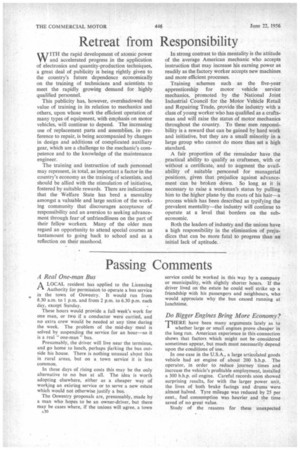Retreat from Responsibility
Page 32

If you've noticed an error in this article please click here to report it so we can fix it.
TITthe rapid development of atomic power and accelerated progress in the application of electronics and quantity-production techniques, a great deal of publicity is being rightly given to the country's future dependence economically on the training of technicians and scientists to meet the rapidly growing demand for highly qualified personnel.
This publicity has, however, overshadowed the value of training in its relation to mechanics and others, upon whose work the efficient operation of many types of equipment, with emphasis on motor vehicles, will continue to depend. The increasing use of replacement parts and assemblies, in preference to repair, is being accompanied by changes in design and additions of complicated auxiliary gear, which are a challenge to the mechanic's competence and to the knowledge of the maintenance engineer.
The training and instruction of such personnel may represent, in total, as important a factor in the country's economy as the training of scientists, and should be allied with the stimulation of initiative, fostered by suitable rewards. There are indications that the Welfare State has bred a mentality amongst a valuable and large section of the working community that discourages acceptance of responsibility and an aversion to seeking advancement through fear of unfriendliness on the part of their fellow workers. Many of the older men regard an opportunity to attend special courses as tantamount to going back to school and as a reflection on their manhood. In strong contrast to this mentality is the attitude of the average American mechanic who accepts instruction that may increase his earning power as readily as the factory worker accepts new machines and more efficient processes.
Training schemes such as the five-year apprenticeship for motor vehicle service mechanics, promoted by the National Joint Industrial Council for the Motor Vehicle Retail and Repairing Trade, provide the industry with a class of young worker who has qualified as a craftsman and will raise the status of motor mechanics throughout the country. To these men responsibility is a reward that can be gained by hard work and initiative, but they are a small minority in a large group who cannot do more than set a high standard.
A fair proportion of the remainder have the practical ability to qualify as craftsmen, with or without a certificate, and to augment the availability of suitable personnel for managerial positions, given that prejudice against advancement can be broken down. So long, as it is necessary to raise a workman's status by pulling him to the higher plane by the roots of his hair—a process which has been described as typifying the prevalent mentality—the industry will continue to operate at a level that borders on the subeconomic.
Both the leaders of industry and the unions have a high responsibility in the elimination of prejudices that can be more fatal to progress than an initial lack of aptitude.




































































































